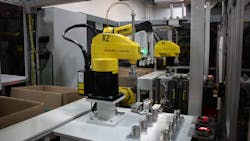Robots open new possibilities for processors, workers
By Karen Hanna
Robots sometimes viewed with suspicion as job-eliminators are finding a new role — as tools that can create opportunity.
In a tight labor market, with demand soaring for certain kinds of plastic products, some automation experts say technology is helping companies achieve efficiencies so they can landing work that might otherwise have been out of reach. In the end, they say, workers — along with processors — stand to profit.
As the president of DevLinks, a certified Fanuc automation integrator, Robbie Devlin has seen it firsthand.
“A typical part that was done overseas, the plastic wheels for a Radio Flyer wagon, we did some automation for that. And that was typically being [made] in China, and then all of a sudden, they’re making them in the States,” Devlin said.
Nigel Smith, president of TM Robotics (Americas), echoed his sentiments.
“If they can get more automation, that means their factory is more efficient, they’re more competitive in the marketplace; therefore, they’re keeping their jobs, rather than the factory closing and moving to the Far East,” said Smith, whose company distributes and services injection molding machines from Shibaura Machine.
Fighting resistance
As companies make record investments in automation, not all employees are embracing the change.
“There’s some people that have in mind that automation and robotics are going to steal our jobs,” said Marc Sansour, robotic sales specialist for Omron’s eastern Canada territory. “But that’s not what it’s doing. What it’s actually doing, it’s [providing] more jobs and more qualified jobs, more high-quality jobs. And it’s also making sure that our companies in Canada and [the] U.S., that they’re not closing down because they’re not able to produce parts or able to bring in revenue. What it’s actually doing is, we’re empowering our manufacturers here in the Americas, and it’s going to generate more and more jobs for people.”
But, Smith said, not everyone sees it that way. He described one technology installation that workers said was constantly breaking down.
“It was a box-cutting machine, which actually is made in Texas. And the operators, we trained and trained and trained these operators, [they’d say] ‘Hey, the robot’s cut the handles off again. The handles are cut off!’ How did that happen? Really?” asked Smith, who characterized the incident as sabotage.
“They think they’ll get turned out on their rear and lose their jobs. It’s all about job protection.”
Breaking through
A consultant for Applied Manufacturing Technologies (AMT), Mike Ingles recounted quite different results when his company, a Fanuc integrator, worked on a project with a brake-rotor maker. Of about 15 workers AMT trained over a few months, about a third showed special aptitude for the automation setup in a cell — and they’re not stuck monitoring just that cell anymore.
With extra training, they’ve moved up.
“Those five or six guys that we designated as the guys that had the ability to expand their abilities or brains, those guys are leading whole plants now, and they have a whole team of people working [under them],” said Ingles, who estimated their pay is 2.5 times higher — or more.
He predicted greater efficiency will facilitate reshoring.
“If you can produce more with the same labor force, then, if you distribute the labor force over the cost of the product, it’s easier for you to be competitive with Mexico, with Asia, with China.”
Smith agreed.
“When you can get automation in, it gives the workers the ability to be redeployed elsewhere." Workers, who were once tied to jobs that were "dangerous, dirty, or menial," Smith said, "can be retrained, redeployed elsewhere to do more interesting tasks."
“But I think what’s also driving it is reshoring,” he said. “You know, people don’t want products coming in from China and other parts of the world that perhaps are not as friendly as the States and other areas, and they want to have products made in the USA. … The global footprint, global warming ... parts get shipped out from the States to China to get machined and then shipped back to the States. Why don’t you just do it all in the States?”
Like others, Smith believes jobs created by robots will be physically less demanding, more intellectually stimulating and higher paying.
Smith said his company, which for decades was known as Toshiba, supplies technologies that are reliable and easy to use. Like other robot experts, he believes this efficiency and productivity will yield results for people who welcome the investment.
“Still, there are people out there that [say], ‘I don't really want robots in my factory. I’d prefer to do it by hand.’ But the cost of labor, the shortage of labor, the quality of the product, reliability of the product means that robots should be your friend in all sorts of ways,” he said.
Karen Hanna, senior staff reporter
Contact:
Applied Manufacturing Technologies, Orion Township, Mich., 248-409-2000, www.appliedmfg.com
DevLinks Ltd., Arlington Heights, Ill., 847-749-0429, www.devlinksltd.com
Omron Automation Americas, Hoffman Estates, Ill., 800-556-6766, automation.omron.com
TM Robotics (Americas) Inc., Elk Grove Village, Ill., 847-709-0429, www.tmrobotics.com
